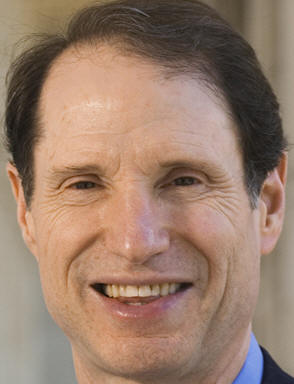Sen. Wyden Introduces Data Caps Bill
December 20, 2012. Sen. Ron Wyden (D-OR) introduced S 3703 [LOC | WW | PDF], the "Data Cap Integrity Act of 2012".
This bill would provide that internet access service providers must obtain permission from the Federal Communications Commission (FCC) before they can impose a "data cap".
It would require the FCC to write and enforce rules that regulate internet access service providers' service and pricing plans.
It provides that "An Internet service provider may not impose a data cap on the consumers of the provider unless the provider is certified by the Commission".
This bill will certainly not be enacted in the few remaining days of the 112th Congress. It is unlikely to be enacted in the 113th Congress. Sen. Wyden has likely introduced this bill to influence public debate about usage based pricing (UBP) for consumer broadband access, and to influence business practices and pricing plans.
Service providers spend immense amounts to build and maintain networks and provide service. They sell service to customers. This entails pricing. However, broadband access is unusual in that it is currently largely a fixed price service. In market economies consumers pay for almost all goods and services according to how much they consume. This holds for things ranging from gasoline and groceries to legal services.
UBP limits the amount that consumers consumer, and is fundamental to the allocation of goods and services by markets.
The bill would also require FCC permission for any "fee-based structure with the purpose of limiting the bits a consumer of an Internet service provider may download". But then, limiting consumption is what UBP does. The bill thus verges on regulating any UBP for broadband access.
Under this bill, the FCC could approve data caps or other forms of UBP. But, the regulatory criteria set forth in the bill are vague. The bill sets a reasonableness standard. It also employs meaningless phrases, such as "Smart Data Caps Instead of Dumb Ones".
Some interests groups, such as the Public Knowledge (PK) have opposed data caps. See for example, April 23, 2012, paper titled "Know Your Limits: Considering the Role of Data Caps and Usage Based Billing in Internet Access Service". That paper praised flat rate price plans, and criticized both UBP plans and data caps on flat rate plans. See also, story titled "Public Knowledge Paper Urges FCC Oversight of BIAS Pricing Plans" in TLJ Daily E-Mail Alert No. 2,380, April 25, 2012.
Others, such as the Phoenix Center for Advanced Legal & Economic Public Policy Studies and the National Cable and Telecommunications Association (NCTA) have defended UBP. See, May 23, 2012 paper [6 pages in PDF] titled "A Most Egregious Act? The Impact on Consumers of Usage-Based Pricing", and story titled "Phoenix Center Defends BIAS UBP" in TLJ Daily E-Mail Alert No. 2,385, May 23, 2012.
See also, paper [18 pages in PDF] titled "The Economics of Usage-Based Pricing in Local Broadband Markets"., and story titled "Paper Argues that Broadband UBP Would Promote Consumer Welfare and Encourage Investment" in TLJ Daily E-Mail Alert No. 2,495, December 20, 2012.
Sen. Wyden's bill would institute FCC regulation of "data caps". Data caps are inseparable from pricing. The concept of data caps is that the service provider offers broadband at a fixed price per month, provided that the user does not exceed a certain level of consumption. If the consumer exceed that level, the price increases.
However, Sen. Wyden has introduced a bill that attempts to separate the concept of consumption from the concept of pricing. The word "price" appears nowhere in the bill. Neither does the phrase "usage based pricing". The definition of "data cap" makes no reference to prices, or even charging of consumers, as if service providers gave service away for free.
 Thus, Sen. Wyden (at right), and
his allies in this debate, may henceforth assert they are not advocating price
regulation.
Thus, Sen. Wyden (at right), and
his allies in this debate, may henceforth assert they are not advocating price
regulation.
Sen. Wyden stated in a release that "Americans are increasingly tethered to the Internet and connecting more devices to it, but they donít really have the tools to effectively manage data consumption across their networks ... Data caps create challenges for consumers and run the risk of undermining innovation in the digital economy if they are imposed bluntly and not designed to truly manage network congestion."
This bill also states that "It is the sense of Congress" that the FCC "should continue its work to ensure that consumers of Internet services are clearly and consistently provided information that describes the services they are purchasing, including -- (1) the cost of the services they are purchasing; (2) the a rate of the upload and download speed that the consumer is paying for; (3) service limits the Internet service provider establishes for purposes of network management, including bandwidth throttling or rate limiting; (4) contract term; and (5) legal and privacy policies."
The NCTA stated in a release that "Regrettably, this ill-conceived legislation ignores the substantial pro-consumer benefits of usage-based pricing. While congestion management may be one effect of tiered pricing, the primary benefits are consumer choice and fairness. Usage tiers give consumers more choices to better fit their bandwidth needs, and they rightly distinguish between low-volume users and high-volume users as is true for many products and services."
See also, PK release praising this bill.
(Published in TLJ Daily E-Mail Alert No. 2,496, December 21, 2012.)
